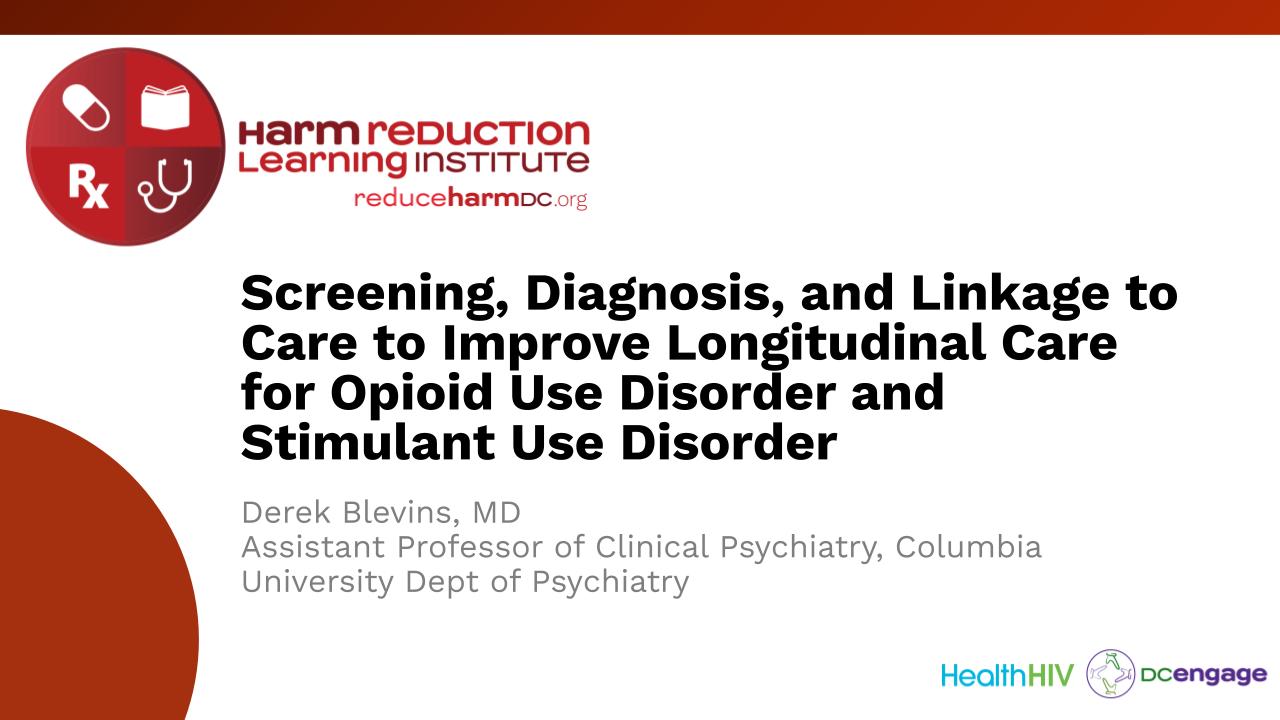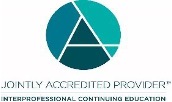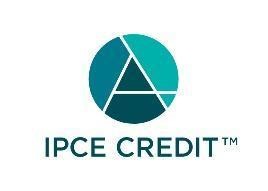
Course Description: Even though evidence-based treatment for opioid use disorders (OUD) is effective, almost four in five Americans with OUD do not receive any form of treatment. The gap in access to evidence-based care, including treatment with medications for OUD, stems in part from barriers to change within the healthcare system. This webinar discusses strategies to increase and improve clinicians’ capacity to provide care for people with OUD and substance use disorder (StUD), increase linkage to care and engagement across various settings, and increase equitable delivery and access to care/services among people who use drugs, as well as those previously underserved by overdose prevention programs.
This course is jointly provided by Postgraduate Institute for Medicine and HealthHIV.
Release Date: June 22, 2024
Expiration Date: June 22, 2025
UAN # JA4008162-9999-24-083-H02-
Target Audience
This activity is intended for physicians, pharmacists, registered nurses, PAs, psychologists, social workers and other healthcare providers engaged in the care of patients with HIV.
Educational Objectives
After completing this activity, the participant should be better able to:
- Identify at least two (2) evidence-based practices for screening, diagnosis and linkage to care that support longitudinal care for OUD and StUD and/or support recovery.
- Identify at least two (2) evidence-based practices for increasing equitable access to services among PWUD and other underserved populations.
- Describe at least three (3) strategies to decrease stigma related to substance use and overdose.
Faculty
Derek Blevins, MD
Assistant Professor of Clinical Psychiatry, Columbia University Dept of Psychiatry
Myra Mathis, MD
Medical Director, Strong Recovery
Program Director, Addiction Psychiatry Fellowship
Assistant Professor of Psychiatry, University of Rochester Medical Center
Disclosure of Conflicts of Interest
Postgraduate Institute for Medicine (PIM) requires faculty, planners, and others in control of educational content to disclose all their financial relationships with ineligible companies. All identified conflicts of interest (COI) are thoroughly vetted and mitigated according to PIM policy. PIM is committed to providing its learners with high quality accredited continuing education activities and related materials that promote improvements or quality in healthcare and not a specific proprietary business interest of an ineligible company.
The faculty reported the following relevant financial relationships with ineligible entities related to the educational content of this CE activity:
The faculty presenter has nothing to disclose.
The PIM planners and others have nothing to disclose. The HealthHIV planners and others have nothing to disclose.
Joint Accreditation Statement
 In
support of improving patient care, this activity has been planned and implemented by the Postgraduate Institute for Medicine and HealthHIV. Postgraduate Institute for Medicine is jointly accredited by the Accreditation Council for Continuing Medical
Education (ACCME), the Accreditation Council for Pharmacy Education (ACPE), and the American Nurses Credentialing Center (ANCC), to provide continuing education for the healthcare team.
In
support of improving patient care, this activity has been planned and implemented by the Postgraduate Institute for Medicine and HealthHIV. Postgraduate Institute for Medicine is jointly accredited by the Accreditation Council for Continuing Medical
Education (ACCME), the Accreditation Council for Pharmacy Education (ACPE), and the American Nurses Credentialing Center (ANCC), to provide continuing education for the healthcare team.
Physician Continuing Medical Education
The Postgraduate Institute for Medicine designates this live activity for a maximum of 1.0 AMA PRA Category 1 Credit(s)™. Physicians should claim only the credit commensurate with the extent of their participation in the activity.
Continuing Nursing Education
The maximum number of hours awarded for this Continuing Nursing Education activity is 1.0 contact hours.
Continuing Pharmacy Education
Postgraduate Institute for Medicine designates this continuing education activity for 1.0 contact hour(s) (0. 10 CEUs) of the Accreditation Council for Pharmacy Education.
Continuing Physician Assistant Education
 Postgraduate Institute for Medicine has been authorized by the American Academy
of PAs (AAPA) to award AAPA Category 1 CME credit for activities planned in accordance with AAPA CME Criteria. This activity is designated for 1.0 AAPA Category 1 CME credits. PAs should only claim credit commensurate with the extent of their
participation.
Postgraduate Institute for Medicine has been authorized by the American Academy
of PAs (AAPA) to award AAPA Category 1 CME credit for activities planned in accordance with AAPA CME Criteria. This activity is designated for 1.0 AAPA Category 1 CME credits. PAs should only claim credit commensurate with the extent of their
participation.
Continuing Social Work Education
![]() As a Jointly Accredited Organization, Postgraduate Institute for Medicine is approved to offer social work continuing education by the Association of Social Work Boards (ASWB) Approved Continuing Education (ACE) program. Organizations, not individual courses, are approved under this program. State and provincial regulatory boards have the final authority to determine whether an individual course may be accepted for continuing education credit. Postgraduate Institute for Medicine maintains responsibility for this course. Social workers completing this course receive 1.0 Clinical continuing education credits.
As a Jointly Accredited Organization, Postgraduate Institute for Medicine is approved to offer social work continuing education by the Association of Social Work Boards (ASWB) Approved Continuing Education (ACE) program. Organizations, not individual courses, are approved under this program. State and provincial regulatory boards have the final authority to determine whether an individual course may be accepted for continuing education credit. Postgraduate Institute for Medicine maintains responsibility for this course. Social workers completing this course receive 1.0 Clinical continuing education credits.
Continuing Psychologist Education
Continuing Education (CE) credits for psychologists are provided through the co-sponsorship of the American Psychological Association (APA) Office of Continuing Education in Psychology (CEP). The APA CEP Office maintains responsibility for the content of the programs.
Credit Designation:
This program offers 1.0 continuing education credits for psychologists.
Interprofessional Continuing Education
 This activity was planned by and for the healthcare team, and learners will receive 1.0 Interprofessional Continuing Education (IPCE) credit for learning and change.
This activity was planned by and for the healthcare team, and learners will receive 1.0 Interprofessional Continuing Education (IPCE) credit for learning and change.
Disclosure of Unlabeled Use
This educational activity may contain discussion of published and/or investigational uses of agents that are not indicated by the FDA. The planners of this activity do not recommend the use of any agent outside of the labeled indications. The opinions expressed in the educational activity are those of the faculty and do not necessarily represent the views of the planners. Please refer to the official prescribing information for each product for discussion of approved indications, contraindications, and warnings.
Disclaimer
Participants have an implied responsibility to use the newly acquired information to enhance patient outcomes and their own professional development. The information presented in this activity is not meant to serve as a guideline for patient management. Any procedures, medications, or other courses of diagnosis or treatment discussed or suggested in this activity should not be used by clinicians without evaluation of their patient's conditions and possible contraindications and/or dangers in use, review of any applicable manufacturer's product information, and comparison with recommendations of other authorities.